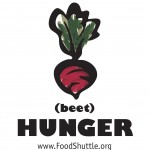 September is Hunger Action Month. Check out one way we're BEETing HUNGER. The Collaborative Regional Alliance for Farmer Training (CRAFT) United Piedmont strengthens the local food system and local network of sustainable farmers -- a key component of a healthy, hunger-free future for our community!
On August 25th, over 30 beginning and established farmers, gardeners, homesteaders, farm interns, and farm-interested folks gathered at Piedmont Biofarm for CRAFT United Piedmont’s 3rd tour of the 2013 season. CRAFT United Piedmont is a farmer-to-farmer collaborative learning project where farmers and apprentices can learn from each other and build a stronger farming community.
September is Hunger Action Month. Check out one way we're BEETing HUNGER. The Collaborative Regional Alliance for Farmer Training (CRAFT) United Piedmont strengthens the local food system and local network of sustainable farmers -- a key component of a healthy, hunger-free future for our community!
On August 25th, over 30 beginning and established farmers, gardeners, homesteaders, farm interns, and farm-interested folks gathered at Piedmont Biofarm for CRAFT United Piedmont’s 3rd tour of the 2013 season. CRAFT United Piedmont is a farmer-to-farmer collaborative learning project where farmers and apprentices can learn from each other and build a stronger farming community.
At Piedmont Biofarm, Farmer Doug Jones and his production team grow a dazzling diversity of vegetables year-round, all while enriching soil fertility. The farm is especially known for its wide array of peppers and sweet potatoes. Along with on-farm seed-saving techniques and growing cool-weather crops through the summer, the farm is committed to sustainable production through a variety of other projects. The CRAFT-UP tour showcased the farm's cultivation of climate-specific varieties of vegetables by selective breeding. In recognition of his dedication to creative and responsible land use, Doug Jones was named 2009 Farmer of the Year by the Carolina Farm Stewardship Association.
Seed-Saving
Doug farmed for 27 years in northern New York state, and after moving to North Carolina, managed the student farm at Central Carolina Community College for 4 years. He decided to start Peidmont Biofarm to focus more on research and teaching.
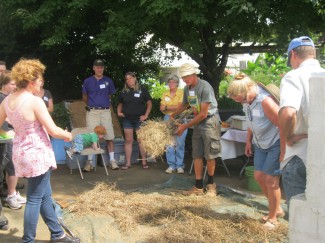
He currently has about 150 breeding lines of peppers he’s working on, focusing on breeding varieties that have all the flavor of hot peppers like habaneros, but without the heat. That way, people can eat more of them, benefiting more from the nutrition packed inside these brightly colored veggies. He also works to breed peppers that have the flavors of heirloom varieties, but the more reliable performance of hybrids. A breeding line becomes a “variety” when the line has stabilized and is ready for sale to seed companies.
Doug hopes to encourage more local seed saving, as currently most of popular organic seed companies are located in the Northeast.
Season Extension and Growing Cooler Weather Crops during Summer
Starting cooler-weather crops during summer gives farmers the advantage of having fall veggies for sale earlier than others in the market, and the veggies only sweeten as they mature into the cooler weather. However, as Doug described, each cooler-weather crop has an “Achilles heel” in warm weather, and Piedmont Biofarm works to identify those weak spots and overcome them on a crop-by-crop basis.
One of the main challenges for starting cooler-weather crops in summer is the danger of the summer heat and sun drying the soil out. If the soil is too dry, crusting on the surface can also be an issue, making it difficult for plants to germinate and break through the surface. To combat this, Piedmont Biofarm waters every day when it’s hot. Water can help cool the soil, but must be applied with care, as too much water can be a problem as well, causing fungal growth and damping off.
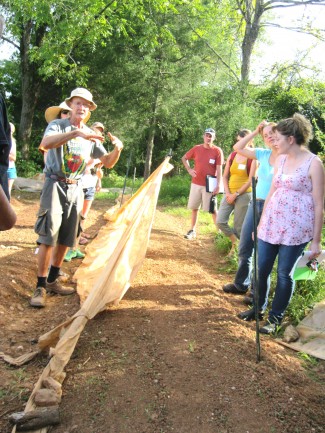 At Piedmont Biofarm, they utilize natural shade and create additional with shade with fabric to help keep the soil cooler and moist to start cooler-weather crops like lettuce and cilantro during the summer. These plants can’t take more than an 85 degree soil temperature without going dormant and need cooler temps to germinate.
At Piedmont Biofarm, they utilize natural shade and create additional with shade with fabric to help keep the soil cooler and moist to start cooler-weather crops like lettuce and cilantro during the summer. These plants can’t take more than an 85 degree soil temperature without going dormant and need cooler temps to germinate.
Another challenge for starting cooler weather crops during summer lies in the insect population of warmer weather. Mustard greens, for example, are fast germinating, but their Achilles heel is susceptibility to insect attacks. To remedy this, Doug uses insect-barrier grade row covers to keep flea beetles off.
Row covers can also act as insect control in more ways that one – not only can they act as barriers, keeping insects out, but the plastic row covers can “solarize” insect populations, killing larvae on plant and in soil with the heat generated beneath them. This practice of insect management keeps the pests from spreading to other areas of the farm, and it utilized after a row has been mostly harvested. Piedmont Biofarm often uses plastic row covers to solarize old bean crops.
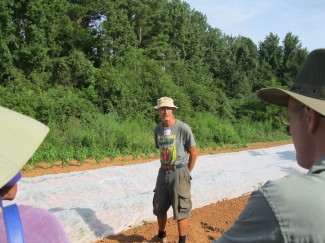 Plastic row covers can protect fall crops later into the season, offering both frost protection and more heat during the day to encourage faster growth, but in our sometimes erratic North Carolina climate, on a warmer fall day, crops can fry beneath them without ventilation.
Plastic row covers can protect fall crops later into the season, offering both frost protection and more heat during the day to encourage faster growth, but in our sometimes erratic North Carolina climate, on a warmer fall day, crops can fry beneath them without ventilation.
Doug is a self-proclaimed addict of the 10-day weather forecast and watches it closely to plan his planting and for when to cover or uncover crops. The hardiness of a plant can be softened by milder weather, but a mild shock can strengthen the plant’s defenses to subsequent frosts and low temperatures.
Shared Ideas, Shared Spaces
One of the great things about CRAFT is how groups like this can spark ideas for collaboration amongst local farmers – like a shared storage and/or curing facility to smaller farmers growing sweet potatoes in the region, one idea that was generated during the tour.
Sweet potatoes can’t take soil or storage below 50 degrees, and must be cured after harvest at around 85-90 degrees. They’re grown on much larger farms that concentrate on the crop in the eastern part of the state, but finding a good place to store and cure the tubers can be an issue for smaller scale, diversified growers.
Did you know sweet potato greens may help prevent prostate cancer? These plants are eaten primarily for the greens and vines in other cultures, rather than for the tuber, and Doug sells some of the greens he grows to a study that is tracking the effect of adding sweet potato greens to the diet of prostate cancer survivors.
More Research and Experimentation: Maximizing Genetics, Space, and Yield
Doug also likes to experiment with and utilize polycultures on his farm, especially during the winter to save space when growing under high and low tunnels. He plants quick maturing plants like radishes and turnips in between slow-maturing plants like senposai (an Asian collard green) that will need more space later to take advantage of the space and time.
He practices succession planting with crops like edamame that have shorter growing times, so the farm can have them available for harvest and sale for longer.
Currently, he is also experimenting with a type of corn from Peru to see if this later season variety that thrives with shorter days but produces large seeds and huge ears for dry corn can thrive here in North Carolina and be ready for harvest before the first frost.
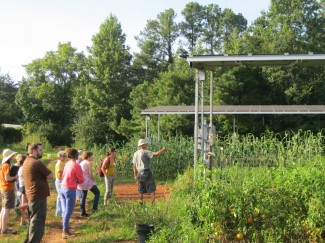
Another experiment in double-cropping, Doug is exploring how solar panels can still be used on agricultural lands without taking it out of production. Carefully determining the shifting shadows and shade created by the panels, he plants underneath them accordingly, as one would utilize sun in cold weather and shade in hot weather. Proving solar panels can co-exist with agriculture could encourage more people to install them.
Want to see more of Piedmont Biofarm or learn more about his peppers or seed-saving operations? Check out the Pittsboro Pepper Festival on Oct. 6th, a tour of his farm as part of the CFSA Sustainable Agriculture conference in November, or seed-saving workshops through the Abundance Foundation.
Want to attend the next CRAFT United Piedmont Farm Tour and Potluck? Learn about retrofitting a produce space for growing mushrooms, led by farmer Meredith Leight at Granite Springs Farm in Pittsboro. Learn more and register here.
You can help BEET HUNGER and support our agricultural training programs by donating today, or help sustain them year-round by becoming a monthly Ground-Level Giver! Or want to get your hands in the dirt, connect to where your food comes from, and help grow wholesome produce? Volunteer on our Teaching Farm!
 September is Hunger Action Month. Learn how volunteers help us BEET HUNGER every day. Sustainable farms are key to a food secure and hunger-free future - find out below how you can volunteer on our Teaching Farm like Yvonne and help us beet hunger, too!
Yvonne Wagner opens the Inter-Faith Food Shuttle Teaching Farm every Tuesday morning. One of the tasks included in this volunteer job is moving the goats from their paddock to fresh pasture to graze. It can be a risky business, but it's all part of running a farm!
September is Hunger Action Month. Learn how volunteers help us BEET HUNGER every day. Sustainable farms are key to a food secure and hunger-free future - find out below how you can volunteer on our Teaching Farm like Yvonne and help us beet hunger, too!
Yvonne Wagner opens the Inter-Faith Food Shuttle Teaching Farm every Tuesday morning. One of the tasks included in this volunteer job is moving the goats from their paddock to fresh pasture to graze. It can be a risky business, but it's all part of running a farm!





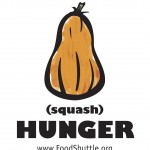 September is Hunger Action Month. We work to address the two root causes of hunger: lack of income and lack of access to enough good food. The
September is Hunger Action Month. We work to address the two root causes of hunger: lack of income and lack of access to enough good food. The 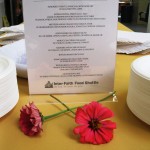 CJTP students come from all walks of life and background. As graduate Sharon said, "I'm proof that you're never too old to learn something new." IFFS's Culinary Job Training Program helps unemployed and underemployed individuals with life challenges do just that - learn a new skill for a new, self-sufficient future.
CJTP students come from all walks of life and background. As graduate Sharon said, "I'm proof that you're never too old to learn something new." IFFS's Culinary Job Training Program helps unemployed and underemployed individuals with life challenges do just that - learn a new skill for a new, self-sufficient future.
 At Piedmont Biofarm, they utilize natural shade and create additional with shade with fabric to help keep the soil cooler and moist to start cooler-weather crops like lettuce and cilantro during the summer. These plants can’t take more than an 85 degree soil temperature without going dormant and need cooler temps to germinate.
At Piedmont Biofarm, they utilize natural shade and create additional with shade with fabric to help keep the soil cooler and moist to start cooler-weather crops like lettuce and cilantro during the summer. These plants can’t take more than an 85 degree soil temperature without going dormant and need cooler temps to germinate. Plastic row covers can protect fall crops later into the season, offering both frost protection and more heat during the day to encourage faster growth, but in our sometimes erratic North Carolina climate, on a warmer fall day, crops can fry beneath them without ventilation.
Plastic row covers can protect fall crops later into the season, offering both frost protection and more heat during the day to encourage faster growth, but in our sometimes erratic North Carolina climate, on a warmer fall day, crops can fry beneath them without ventilation.
 Raise the Roots (RtR) will work with interested residents to design and build various sizes of raised garden beds in the residents’ backyards. RrR will provide supplies and materials to get the residents started, all free of charge through this fall and following spring. They’ll also provide free workshops in gardening and food preparation after the planting season to help residents manage and prepare what they grow. The youth garden mentors will do what their name suggests, and provide ongoing support and assistance to the new backyard gardeners.
Raise the Roots (RtR) will work with interested residents to design and build various sizes of raised garden beds in the residents’ backyards. RrR will provide supplies and materials to get the residents started, all free of charge through this fall and following spring. They’ll also provide free workshops in gardening and food preparation after the planting season to help residents manage and prepare what they grow. The youth garden mentors will do what their name suggests, and provide ongoing support and assistance to the new backyard gardeners. While the garden beds will be in individual residents’ backyards, the building of them will be a community effort. In order to receive a garden bed, residents are asked to help build at least 2 other beds in the neighborhood as well. They’re signing up to grow, to learn, and to help other neighbor gardeners as they can.
While the garden beds will be in individual residents’ backyards, the building of them will be a community effort. In order to receive a garden bed, residents are asked to help build at least 2 other beds in the neighborhood as well. They’re signing up to grow, to learn, and to help other neighbor gardeners as they can.
